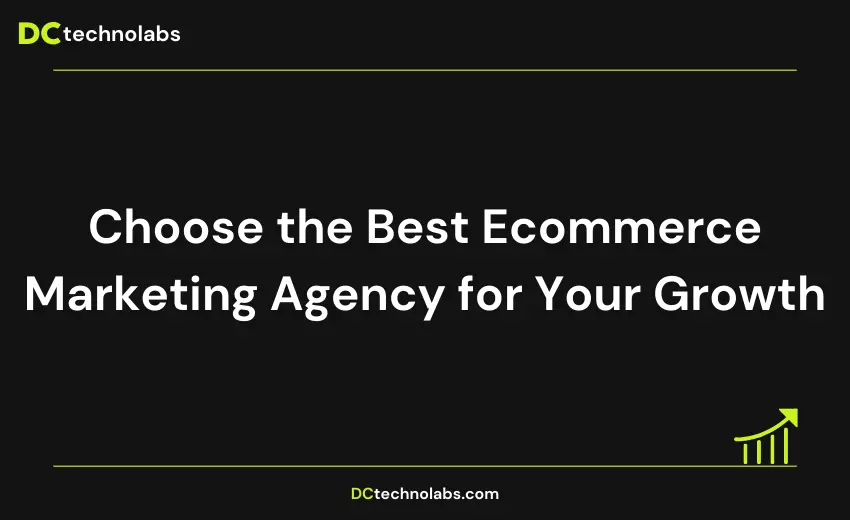
Are you struggling to increase your online sales and take your E-commerce business to new heights? Look no further! With the help of the best Ecommerce Marketing Agency, you can boost your sales and achieve your business goals.
Our team of experts specializes in E-commerce marketing strategies that are proven to drive results. From optimizing your website for search engines to creating compelling content, we know exactly what it takes to attract more customers and convert them into loyal buyers.
Through strategic keyword research and implementation, we can ensure that your website ranks high on search engine results pages, making it easier for potential customers to find you. Our tailored marketing campaigns will help you reach your target audience and generate leads that are more likely to convert.
With years of experience in the E-commerce industry, we understand the unique challenges and opportunities it presents. Let us take care of your online marketing needs so you can focus on what you do best – running your business. Don’t let potential customers slip through your fingers – contact the best E-commerce marketing agency today and watch your sales skyrocket.
- Importance of E-commerce marketing for online sales
- E-commerce marketing statistics
- Key elements of a successful ecommerce marketing strategy
- Identifying your target audience and creating buyer personas
- Optimizing your E-commerce website for search engines
- Utilizing email marketing to drive sales
- Leveraging social media for ecommerce marketing
- Paid advertising strategies for ecommerce businesses
- Choosing the best E-commerce marketing agency for your business
Importance of E-commerce marketing for online sales
In today’s digital age, E-commerce has become an essential part of any successful business strategy. As more and more consumers turn to the internet to make their purchases, it’s crucial for businesses to have a strong online presence and a well-executed E-commerce marketing plan.
E-commerce marketing is the process of promoting your online store, products, and services to potential customers through various digital channels. It encompasses a wide range of strategies and tactics, including search engine optimization (SEO), social media marketing, email marketing, and paid advertising. By leveraging these techniques, businesses can attract more visitors to their website, convert them into paying customers, and build long-lasting relationships with their audience.
The importance of E-commerce marketing for online sales cannot be overstated. In a highly competitive online landscape, businesses that fail to invest in effective E-commerce marketing strategies are likely to struggle to attract and retain customers, ultimately impacting their bottom line. On the other hand, businesses that prioritize E-commerce marketing can enjoy a range of benefits, such as increased brand awareness, higher website traffic, improved conversion rates, and ultimately, greater online sales and revenue.
E-commerce marketing statistics
The growth of E-commerce has been nothing short of remarkable in recent years, and the statistics reflect the increasing importance of E-commerce marketing for businesses of all sizes.
According to a report by Statista, global E-commerce sales are expected to reach $5.4 trillion by 2026, up from $3.3 trillion in 2019. This represents a significant opportunity for businesses to tap into the growing online marketplace and reach a wider customer base.
Another study by Oberlo found that 63% of shopping occasions start online, even for purchases that are ultimately made in-store. This highlights the critical role that E-commerce marketing plays in the customer journey, as businesses need to ensure that their online presence is visible and compelling to attract and engage potential customers.
Furthermore, a report by Shopify revealed that mobile commerce accounts for 72.9% of total E-commerce sales, underscoring the importance of optimizing E-commerce marketing strategies for mobile devices. Businesses that fail to prioritize mobile-friendly design and user experience risk losing out on a significant portion of their potential customer base.
These statistics demonstrate the immense potential of E-commerce marketing and the urgency for businesses to invest in effective strategies to boost their online sales and remain competitive in the digital marketplace.
Key elements of a successful ecommerce marketing strategy
Developing a comprehensive and effective E-commerce marketing strategy is crucial for businesses looking to drive online sales and achieve long-term success. While the specific tactics and approaches may vary depending on the industry, target audience, and business goals, there are several key elements that are essential for any successful E-commerce marketing strategy.
Thorough market research:
Before implementing any E-commerce marketing tactics, it’s essential to conduct thorough market research to understand your target audience, their pain points, preferences, and buying behaviors. This will help you create buyer personas and develop a deep understanding of your customers, which is crucial for crafting targeted and effective marketing campaigns.
Optimized website and user experience:
Your E-commerce website is the foundation of your online presence and the primary touchpoint for your customers. Ensuring that your website is optimized for search engines, user-friendly, and provides a seamless shopping experience is crucial for driving conversions and building customer loyalty.
Multichannel marketing approach:
Successful E-commerce marketing strategies often involve a combination of various digital marketing channels, such as search engine optimization (SEO), social media marketing, email marketing, and paid advertising. By leveraging a diverse range of channels, businesses can reach their target audience through multiple touchpoints and increase the chances of conversion.
Personalized and engaging content:
Providing your customers with valuable, informative, and engaging content can help build brand awareness, establish your business as an industry authority, and foster stronger relationships with your audience. This can include blog posts, product descriptions, social media updates, and email campaigns tailored to the specific needs and interests of your target customers.
Data-driven decision making:
E-commerce marketing is a data-driven discipline, and successful strategies rely on the continuous analysis and optimization of key performance metrics. By tracking and analyzing data such as website traffic, conversion rates, customer behavior, and campaign performance, businesses can make informed decisions, identify areas for improvement, and continuously refine their marketing efforts.
Ongoing testing and optimization:
E-commerce marketing is not a one-time endeavor; it requires an iterative approach of testing, analyzing, and optimizing different strategies and tactics to ensure their effectiveness. By continuously experimenting with new approaches, businesses can stay ahead of the competition and adapt to changing market conditions and customer preferences.
By incorporating these key elements into their E-commerce marketing strategy, businesses can position themselves for long-term success and drive sustained growth in their online sales.
Identifying your target audience and creating buyer personas
Effective E-commerce marketing starts with a deep understanding of your target audience. Before you can develop and implement any marketing strategies, it’s crucial to identify who your ideal customers are, what their needs and pain points are, and how they prefer to engage with your brand.
One of the most effective ways to achieve this is by creating detailed buyer personas. Buyer personas are semi-fictional representations of your ideal customers, based on market research, customer data, and insights from your sales and marketing teams. These personas should include demographic information, such as age, gender, location, and income level, as well as psychographic data, including their interests, values, goals, and buying behaviors.
By developing these buyer personas, you can gain a more nuanced understanding of your target audience and tailor your E-commerce marketing efforts accordingly. For example, if your primary customer segment is young, tech-savvy millennials, your marketing strategy might focus on social media platforms, influencer collaborations, and mobile-optimized content. On the other hand, if your target audience is older, more affluent consumers, your approach might emphasize email marketing, paid search advertising, and content that highlights the quality and exclusivity of your products.
Moreover, regularly updating and refining your buyer personas is crucial, as customer preferences and market trends can evolve over time. By staying attuned to these changes, you can ensure that your E-commerce marketing strategies remain relevant and effective in reaching and engaging your target audience.
Ultimately, investing the time and resources to identify your target audience and create detailed buyer personas is a key step in developing a successful E-commerce marketing strategy that drives measurable results and helps your business stand out in a crowded online marketplace.
Optimizing your E-commerce website for search engines
In the world of E-commerce, a well-optimized website is the foundation for driving online sales and attracting potential customers. Search engine optimization (SEO) is a critical component of any successful E-commerce marketing strategy, as it helps ensure that your website and products are easily discoverable by your target audience.
One of the primary goals of E-commerce SEO is to improve your website’s visibility in search engine results pages (SERPs), making it more likely that potential customers will find and engage with your brand. By implementing a range of on-page and off-page optimization techniques, you can boost your website’s search engine rankings and drive more organic traffic to your online store.
Some of the key elements of E-commerce SEO include:
Keyword research and implementation:
Identifying the right keywords and phrases that your target audience is searching for and incorporating them throughout your website, from product descriptions to blog content, can significantly improve your search engine visibility.
Optimized product pages:
Ensuring that your product pages are well-structured, with compelling, keyword-rich content, high-quality images, and clear calls-to-action, can enhance the user experience and increase the chances of conversion.
Technical website optimization:
Addressing technical issues such as site speed, mobile-friendliness, and website structure can improve your website’s performance and overall search engine rankings.
Link building and content marketing:
Developing a comprehensive content marketing strategy and building high-quality backlinks from reputable sources can boost your website’s authority and credibility in the eyes of search engines.
Ongoing monitoring and optimization:
Regularly tracking and analyzing your website’s SEO performance, identifying areas for improvement, and continuously optimizing your strategies can help you stay ahead of the competition and maintain strong search engine visibility over time.
By prioritizing E-commerce SEO as part of your overall marketing strategy, you can ensure that your online store is easily found by your target customers, leading to increased website traffic, higher conversion rates, and ultimately, greater online sales.
Utilizing email marketing to drive sales
Email marketing is a powerful tool in the E-commerce marketing arsenal, as it allows businesses to directly connect with their customers and drive sales. By leveraging email campaigns, E-commerce companies can nurture leads, cross-sell and upsell products, and build long-lasting relationships with their audience.
One of the key advantages of email marketing for E-commerce is its ability to deliver personalized and targeted content. By segmenting your email list based on factors such as purchase history, browsing behavior, and customer preferences, you can create highly relevant and engaging email campaigns that resonate with your audience and encourage them to take action.
Some of the most effective email marketing strategies for E-commerce businesses include:
Welcome and onboarding emails:
These emails are sent to new subscribers or customers, introducing your brand, highlighting your products or services, and encouraging them to engage with your business.
Abandoned cart email sequences:
By sending timely email reminders to customers who have left items in their shopping carts, you can encourage them to complete their purchases and boost your conversion rates.
Product recommendations and cross-selling:
Leveraging customer data to suggest relevant products or complementary items can increase the average order value and drive additional sales.
Promotional and seasonal email campaigns:
Highlighting special offers, discounts, or new product launches can create a sense of urgency and motivate customers to make a purchase.
Loyalty and retention emails:
Rewarding loyal customers with exclusive offers, sneak peeks, or VIP experiences can help build brand loyalty and encourage repeat business.
To maximize the impact of your email marketing efforts, it’s essential to continuously monitor and optimize your campaigns based on key performance metrics, such as open rates, click-through rates, and conversion rates. By analyzing this data, you can refine your email content, subject lines, and targeting strategies to ensure that your ecommerce marketing campaigns are as effective as possible.
By integrating a well-executed email marketing strategy into your overall ecommerce marketing plan, you can effectively nurture leads, drive sales, and foster stronger relationships with your customer base.
Leveraging social media for ecommerce marketing
In the modern digital landscape, social media has become an indispensable tool for E-commerce businesses looking to reach and engage their target audience. By leveraging the power of various social media platforms, E-commerce companies can build brand awareness, drive website traffic, and ultimately, boost their online sales.
One of the key advantages of social media marketing for E-commerce is its ability to create a more personal and authentic connection with customers. By sharing engaging content, interacting with followers, and responding to their queries and feedback, E-commerce businesses can cultivate a loyal community of brand advocates who are more likely to make repeat purchases and refer others to the business.
Some of the most effective social media marketing strategies for E-commerce include:
Establishing a strong brand presence:
Developing a cohesive and visually appealing social media presence, with consistent branding, high-quality visuals, and a unique brand voice, can help your E-commerce business stand out in a crowded social media landscape.
Leveraging user-generated content:
Encouraging customers to share their experiences, photos, and reviews of your products can not only build social proof but also provide you with a steady stream of engaging content to share across your social media channels.
Influencer and partnership collaborations:
Partnering with relevant influencers, industry experts, or complementary brands can help you reach new audiences, boost brand credibility, and drive sales through collaborative content and promotions.
Targeted social media advertising:
Utilizing the advanced targeting capabilities of social media platforms, such as Facebook Ads or Instagram Ads, can help you reach your ideal customers with highly personalized and effective advertising campaigns.
Social media customer service:
Responding promptly and effectively to customer inquiries, feedback, and concerns on social media can improve customer satisfaction, build trust, and enhance your brand’s reputation.
To ensure the success of your E-commerce social media marketing efforts, it’s essential to continuously monitor and analyze your performance, identify the platforms and strategies that are most effective for your business, and adapt your approach as needed to stay ahead of the competition.
By incorporating a well-executed social media marketing strategy into your E-commerce marketing plan, you can effectively reach and engage your target audience, drive website traffic, and ultimately, boost your online sales.
Paid advertising strategies for ecommerce businesses
In addition to organic marketing tactics, ecommerce businesses can also leverage various paid advertising strategies to drive more traffic, generate leads, and increase sales. Paid advertising can be a highly effective way to reach your target audience, especially when combined with a comprehensive ecommerce marketing strategy.
Some of the most popular and effective paid advertising channels for ecommerce businesses include:
Search engine advertising (PPC):
Running pay-per-click (PPC) campaigns on search engines like Google and Bing can help your ecommerce business appear at the top of search results for relevant keywords, increasing visibility and driving more qualified traffic to your website.
Social media advertising:
Leveraging the powerful targeting capabilities of social media platforms, such as Facebook Ads, Instagram Ads, and LinkedIn Ads, can help you reach your ideal customers with highly personalized and engaging ad content.
Display advertising:
Utilizing programmatic display advertising, where your ads are automatically placed on relevant websites and apps, can help you reach a wider audience and increase brand awareness.
Retargeting and remarketing:
By targeting users who have previously interacted with your website or brand, you can re-engage them with personalized ads and encourage them to complete a purchase or take another desired action.
Influencer marketing:
Collaborating with influential individuals or “influencers” within your industry can help you reach new audiences, build trust and credibility, and drive sales through sponsored content and product placements.
When implementing paid advertising strategies for your ecommerce business, it’s essential to have a clear understanding of your target audience, set specific and measurable goals, and continuously monitor and optimize your campaigns based on performance data. This will help you maximize the return on your advertising investment and ensure that your paid marketing efforts are aligned with your overall ecommerce marketing strategy.
By leveraging a combination of paid advertising tactics, along with your organic marketing efforts, you can effectively reach and engage your target customers, drive more traffic to your ecommerce website, and ultimately, boost your online sales.
Choosing the best E-commerce marketing agency for your business
As an E-commerce business owner, you may find it challenging to keep up with the ever-evolving landscape of digital marketing and the latest trends and strategies. This is where partnering with a reputable E-commerce marketing agency can be invaluable.
An experienced E-commerce marketing agency can provide your business with a range of specialized services and expertise that can help you achieve your online sales goals. From developing a comprehensive marketing strategy to executing and optimizing various tactics, a skilled agency can be a true game-changer for your E-commerce business.
When selecting the best E-commerce marketing agency for your business, there are several key factors to consider:
Industry experience:
Look for an agency that has a proven track record of success in the E-commerce industry and can demonstrate a deep understanding of the unique challenges and opportunities it presents.
Comprehensive service offerings:
The agency should offer a wide range of E-commerce marketing services, including SEO, social media marketing, email marketing, paid advertising, and content creation, to ensure that your marketing efforts are well-rounded and effective.
Customized approach:
The agency should be willing to take the time to understand your business, your target audience, and your specific goals, and then develop a tailored marketing strategy that aligns with your needs.
Transparent communication and reporting:
The agency should be transparent about their processes, communication channels, and reporting methods, ensuring that you have a clear understanding of the progress and performance of your marketing campaigns.
Measurable results:
The agency should be able to demonstrate a track record of delivering measurable results, such as increased website traffic, higher conversion rates, and greater online sales.
Collaborative partnership:
The agency should be willing to work closely with your in-house team, providing guidance, support, and ongoing optimization to ensure the long-term success of your E-commerce marketing efforts.
By carefully evaluating these factors and selecting the best E-commerce marketing agency for your business, you can unlock the full potential of your online sales and take your E-commerce business to new heights.
Conclusion
In conclusion, partnering with the right Ecommerce Marketing Agency can be the key to unlocking your online sales potential. By implementing tailored strategies that focus on SEO, social media marketing, email campaigns, and data-driven insights, you can attract more customers, improve conversions, and grow your business. As experts in both Ecommerce marketing and IT solutions through DC Technolabs, we offer a comprehensive approach to help you achieve your goals. Ready to elevate your business? Get in touch today and let’s work together to drive success.
If you found this blog helpful, check some of the other blogs below:
- Boost Your Brand with Expert Solar Website Design
- 8 Reasons Why Custom WordPress Development is Essential
For more insights and updates on web design for small businesses, follow us on Instagram, Facebook, LinkedIn, and Twitter.






